Towelhead
 for strong disturbing sexual content and abuse involving a young teen, and for language.
for strong disturbing sexual content and abuse involving a young teen, and for language.
Reviewed by: Kenneth R. Morefield
CONTRIBUTOR
| Moral Rating: | Extremely Offensive |
| Moviemaking Quality: |
|
| Primary Audience: | Adults |
| Genre: | Dark-Comedy Drama Adaptation |
| Length: | 2 hr. 4 min. |
| Year of Release: | 2008 |
| USA Release: |
September 12, 2008 (limited) September 26, 2008 (100 theaters) DVD release: December 30, 2008 |
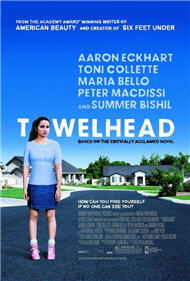
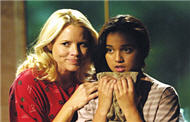
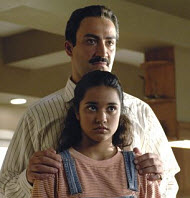


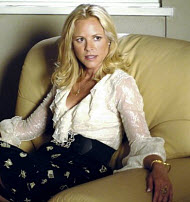




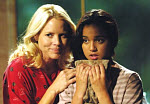
How can I deal with temptations? Answer
Should I save sex for marriage? Answer
| Featuring |
|---|
| Summer Bishil, Aaron Eckhart, Peter Macdissi, Toni Collette, Maria Bello, Eugene Jones III, Matt Letscher, Chase Ellison, Gemmenne de la Peña, Lynn Collins, Robert Baker, Lisa Catara, Larry Cedar, Randy J. Goodwin, Shari Headley, Kim Knight, John Lacy, Michael McShae, Chris Messina, LoriDawn Messuri, Alejandro Patino, Carrie Preston, Lorna Scott, Soledad St. Hilaire, Lee von Ernst, Irina Voronina, Nathalie Walker |
| Director |
|
Alan Ball |
| Producer |
| Alan Ball, Anne Carey, Ted Hope, Christina Jokanovich, Peggy Rajski, Scott Rudin |
| Distributor |
|
Red Envelope Entertainment |
“How can you find yourself if no one can see you?”
When I first saw “Towelhead” (then called “Nothing is Private”) at the 2007 Toronto Film Festival, I opined in my blog that to like this movie one would have to “truly, madly, deeply, passionately” love the work of Alan Ball—and I just don’t.
I appreciated bits and pieces of “Six Feet Under” (Ball’s made for cable series), but I found “American Beauty” (directed by Sam Mendes but written by Ball) self-important and smug. Rather than combining some of the best features of those two works, “Towelhead” combines some of the worst: it has “Beauty”’s sense of self-importance and condescension (Ball’s works often chastise you for disliking or disapproving of their characters rather than doing the harder work of actually making you sympathize with them) and “Six Feet Under”’s fascination with the seamy and taboo. The fact that Warner Brothers pushed the film back to 2008, changed the title, and (somewhat tackily, in my opinion) gave it a day-after September 11th opening all suggest that despite Ball’s reputation, the film just simply isn’t generating the art house or Oscar buzz that would help it find any sort of mainstream audience.
Adapted from the novel by Alicia Erian, “Towelhead” centers around Jasira, an Arab-American girl struggling to come of age while living with a father who is both hyper-controlling (he refuses to let her use a tampon when she menstruates) and haplessly remote (he spends the bulk of his time watching news reports of the Gulf War and railing against the injustice of receiving the anti-Arab backlash of his neighbors when he hates Saddam Hussein more than they do).
Jasira’s rather bleak home life (her mother has left her father and has no interest in maintaining a relationship with her) engenders a certain amount of sympathy, but the script has her move from one exploitation to another without ever letting us (or her) process the meaning of what she is going through. She gets herself an African-American boyfriend (if we can call him that) who at first seems nice but quickly shows that he really only cares about her as a partner in sexual experimentation. (One oft-commented upon scene between them involves pubic shaving.) She interviews Mr. Vuoso (Aaron Eckhart, who may pull in some viewers based on his work in “The Dark Knight”), a neighbor and soldier, for a school project and he ends up digitally raping her (on screen). For awhile, she falls under the wing of her pregnant neighbor, Melina (Toni Collette) who seems more interested in giving Jasira sanctuary as some sort of feminist or cultural statement against her father than in actually giving Jasira any guidance on how to make good decisions or work at creating the life she would like to have rather than just lamenting that she doesn’t have it.
And so it goes, as the film moves from caricature to caricature, each lampooning (these characters are deliberately overblown for satirical effect, right?) some facet of self-absorbed American narcissism that Ball or Erian finds contemptible. That’s all well and good—I’m happy to criticize the soul-crushing effects of a culture built on and around moral license and resulting in alienation—but the film offers no serious alternatives to the worldviews it denigrates. Ultimately, Ball’s modus operandi is to suggest that sympathy is the truer, more sublime response to any transgression we witness because we are all in the same boat and all moral transgressions must just be ultimately the same.
I may live to regret saying this, but while I appreciate and chuckle at Ball’s ability to spotlight the obtuse hypocrisies that are often present in the hicks, zealots, and fascists of the modern world, there is an oversimplification in his one-size-fits all deconstruction of human weakness that I find as monolithic and absolutist as the people he most loves to caricature. People do bad things until you dislike them then they do something good so that the film can scold you for being intolerant; people do good things until you like them then they do something bad so that the film can pity you your naiveté for trusting anyone. His works recognize that venality is not the same thing as evil and argues that being conflicted about one's evil makes one a more complicated and sympathetic person than those who are unconflicted about their venality.
That’s why I don’t think it is a coincidence that there is an older man who is sexually transfixed with an underage girl in so many of Ball’s works—“American Beauty,” “Six Feet Under,” (Billy and Claire) and now “Towelhead.” Perhaps the fixation with sexual taboos is meant to convey analogously to a straight audience what it feels like to be gay in a culture that makes that a taboo and to be told that one has to fight against what one feels to be natural or a part of one’s very self. If so, though, the analogy isn’t entirely clear or persuasive. Because, while it is the gay characters in Ball’s work that try to repress their orientation who end up being the most self-destructive (David in “Six Feet Under”) or damaging to others (Colonel Fitts in “American Beauty”), it’s hard to see how that argument wouldn’t lead to characters like Lester Burnham (in “American Beauty”) or Mr. Vuoso getting not just sympathy, but a pass for their transgressive behavior. Surely repressing some urges (such as the urge to rape a minor) is appropriate isn’t it? Or are we meant to understand that these more destructive urges are only the inevitable result of having to repress more benign urges that could have been less destructive had those who felt them been given social license to find an appropriate outlet? If so, color me… um, skeptical.
I tend to believe that a good movie review should be less about whether or not the reviewer liked the film than about giving the reader a sense of whether or not he or she would. There are always going to be differences in tastes and tolerances between reviewer and reader. This means, among other things, that when one is writing for a Christian audience and one gives a bad review to a film or work with explicit content, one always wants to stress that it isn’t just the presence of objectionable* content (for some, and certainly for me) that leads to the negative estimation. The quickest and easiest way to do that is to point to films I have reviewed (elsewhere) or seen that deal with equally taboo or difficult subject matter but which did so with more artistry and insight and therefore could be recommended to some viewers who are not totally against seeing any objectionable content. Works like “The Squid and the Whale,” “The Wire,” “Eyes Wide Shut,” “The Crying Game,” “Lolita” or “Interview with a Vampire” all have explicit content and deal with some taboo subjects, yet managed to earn my respect.
“Towelhead,” by contrast, is one of those works that just comes off as trying to push the envelope for no apparent reason—to be confrontational because that’s the easiest way to get attention when one can’t be insightful or persuasive.
My Grade: F
*Christian viewers who are particularly sensitive to profane or obscene language should probably note that I saw this film over 11 months ago and don’t tend to focus on language that much. While I can’t imagine there would be viewers who are particularly sensitive to profanity or obscenity who wouldn’t be warned off by the sexual content, I feel I ought to state that I would not be surprised to be told that the amount of profanity or obscenity was significantly greater or significantly less than what I remember.
Violence: Moderate / Profanity: Moderate / Sex/Nudity: Extreme
Editor's note:
See list of Relevant Issues—questions-and-answers.


Fortunately, I stumbled upon this site with a reasonable review by someone who could actually tell me what the film is about, and why it may not be worthwhile. Based on this information, I can make the educated decision not to see this film. So, thank you.



I haven’t seen anything more disgusting in my life. Aaron Eckhart is a very successful actor in his career, but I couldn’t bear watching him seduce her and end up groping and engaging in sexual acts with her. An adult engaging sexual behavior to a 13 year old girl in this movie made me so sick that I literally lost my appetite.
Another aspect of the movie that upset me is that she kept getting called derogatory names, and one of the characters apologized, and, before you know it, he is asking for sex and even bought her a shaving razor. Absolutely sickening!
My Ratings: Moral rating: Extremely Offensive / Moviemaking quality: 1